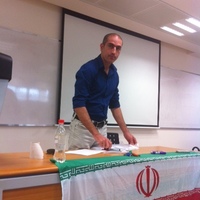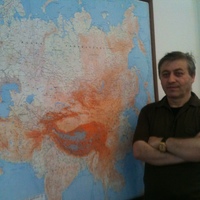
Farzan Sabet
I am a Postdoctoral Fellow at the Global Governance Centre at the Graduate Institute, Geneva. My postdoctoral project is entitled "Bombs, Banks and Sanctions: A Sociology of the Transnational Legal Field of Nuclear Nonproliferation."
Supervisors: Grégoire Mallard
Supervisors: Grégoire Mallard
less
Related Authors
Joe Maiolo
King's College London
Martin van Bruinessen
Universiteit Utrecht
Bayram Sinkaya
Ankara Yildirim Beyazit University
Armando Marques-Guedes
UNL - New University of Lisbon
Ronen A. Cohen
Ariel University
Paulo Botta
Pontificia Universidad Católica Argentina
S. M. Hadi Gerami
Institute for Humanities and Cultural Studies
Andrea Brazzoduro
Università Degli Studi di Napoli "L'Orientale"
Rudolph (Rudi) Matthee
University of Delaware
Süer Eker
Baskent University
InterestsView All (14)










Uploads
Papers by Farzan Sabet
Scholars have painstakingly debated U.S. policy to reinforce the nuclear nonproliferation regime following the 1974 Indian “Smiling Buddha” peaceful nuclear explosion and contemporaneous decisions by nuclear suppliers like France and West Germany to export sensitive nuclear technologies to states like Pakistan and Brazil. In emphasizing the risk of proliferation, they have often missed the broader international debate provoked by the 1973 oil crisis that framed nuclear technology not only as a risk, but also an opportunity to meet burgeoning global energy demand. My book project explores this debate through the prism of the Iranian nuclear program, U.S. policy, and nonproliferation regime in the 1970s.
The first part of the book manuscript looks the decision by Iran under Mohammad Reza Pahlavi to launch one of the most ambitious nuclear programs of the 1970s. The existing historiography has alternatively emphasized security or prestige as motivations behind the program. I demonstrate that the program primarily sought to transform the Iranian economy through nuclear technology in line with demands by the global south for a New International Economic Order that created a more equitable relationship with the north. I also marshal new evidence to show that the secondary goal of the program was to create a nuclear weapon option. The second part of the manuscript examines how the United States under presidents Gerald Ford and Jimmy Carter used nuclear cooperation negotiations with the shah as a centerpiece of its efforts to stop proliferation. The U.S.-Iran nuclear cooperation agreement reached in 1978 was to be a model agreement for other suppliers and recipients. But it was ultimately never signed for a variety of reasons, including U.S. suspicions about Iranian motives.
The third and final part of the manuscript demonstrates how Iran under the Shah became the lynchpin of a coalition of transnational nuclear elites that contested U.S.nonproliferation policy. This contestation came to a head at the April 1977 Persepolis Conference on the Transfer of Nuclear Technology, which the trade press at the time characterized as a "revolt" against U.S. policy. Nuclear proliferation in the 1970s - as with the energy crisis, arms control, and human rights - thus became a zone of both U.S.-Iran cooperation and contestation. These finding suggest greater continuity between pre- and post-revolution Iran due to changes in the structure of international system than the scholarship has previously held. The manuscript draws on U.S., British, French, and Iranian archival documents and oral interviews and is strongly informed by both the scholarship on the global Cold War, international nuclear history, and security studies.